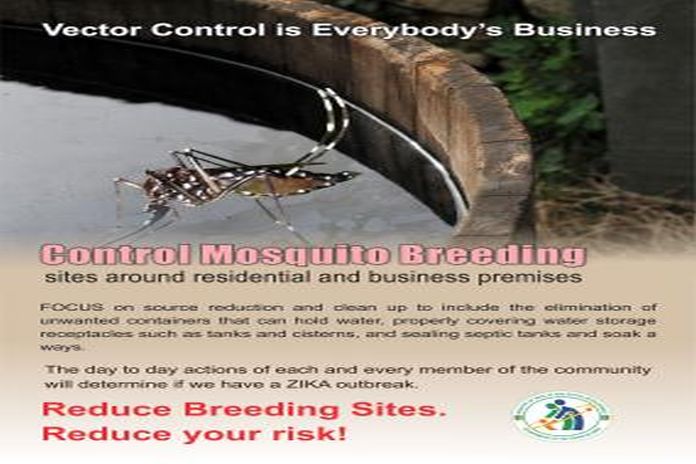By Natasha Lettsome-Humphrey
TORTOLA, BVI – The ministry of health and social development is reporting an increase in the number of dengue fever (DF) cases, including severe dengue requiring hospitalisation.
National Epidemiologist, Harmonie Brewley-Massiah said that while the current number of cases remains below the epidemic threshold, public health officials are closely monitoring the situation.
“The Surveillance and Vector Unit has been keenly monitoring the local situation given the on-going outbreaks in other Caribbean countries,” Brewley Massiah said.
Entomologist, Camille White is also concerned: “Each residential assessment of locally affected persons has identified multiple breeding sites positive for the larvae or pupae of Aedes mosquitoes. Breeding sites were mainly in containers like barrels, buckets, tyres, plant pots and gallon bottles.”
Dengue is a viral infection transmitted to humans through the bite of infected Aedes Egpyti and Albopictus mosquitoes, both of which are endemic to the Virgin Islands.
Symptoms include fever, severe headache, eye-pain, nausea, vomiting, rash, joint and body aches, and, in severe cases, bleeding. Symptoms typically last two to seven days, and although severe and life-threatening illness can occur, most people recover within one to two weeks.
Children, the elderly and persons with a prior infection and/or pre-existing conditions such as diabetes, hypertension, obesity and heart disease are particularly at risk for severe dengue-which may require hospitalisation and intensive medical care.
Health authorities are urging the public to be vigilant and proactive by implementing personal protective measures and strict environmental hygiene (cleanliness and sanitation in their surroundings), especially after heavy rainfall, to help control mosquito breeding.
The ministry of health and social development is working diligently to control the spread of dengue fever. Residents are urged to take the necessary measures to eliminate standing water and reduce mosquito breeding opportunities around their property.
- Dengue is a viral infection transmitted to humans through the bite of infected mosquitoes.
- About half of the world’s population is now at risk of dengue with an estimated 100–400 million infections occurring each year.
- Dengue is found in tropical and sub-tropical climates worldwide, mostly in urban and semi-urban areas.
- While many dengue infections are asymptomatic or produce only mild illness, the virus can occasionally cause more severe cases, and even death.
- Prevention and control of dengue depend on vector control. There is no specific treatment for dengue/severe dengue, and early detection and access to proper medical care greatly lower fatality rates of severe dengue.

